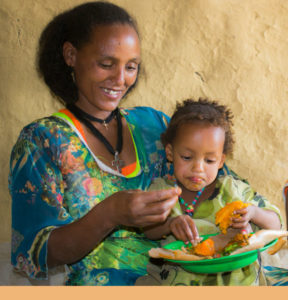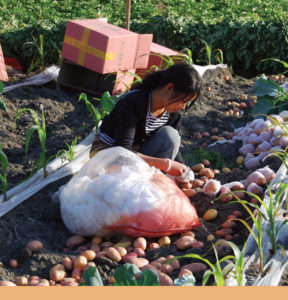From sweetpotato farmer to budding entrepreneurs: Making the leap at Farmer Business School
Climate-resilient root and tuber crops, such as sweetpotato, are critically important food security crops for the 300 million-plus smallholder farmers in developing countries who depend on them. They are strategic tools to improve nutrition, in particular, targeting Vitamin A deficiencies. But Farmer Business School Graduates are learning that there is more to these staples than meets the eye particularly when it comes to providing sustainable incomes and empowering women in business. Sweetpotato jam anyone?
After a visit to the breath-taking Chocolate Hills and an adrenaline-filled day flying through the forest canopy on zip wires, visitors on the remote island of Bohol in the Philippines browse the gift shop for souvenirs. Standing out on the shelves is the smart yellow Camoteville label displayed on a range of locally produced sweetpotato jams, ketchup, candies, and chips.
“In Bohol, the forest is under threat from growing pressure to expand agricultural land. People need to eat and to make money – half of the population lives below the poverty line. To protect the forest, they need alternative livelihood options,” explains Diego Naziri, Value Chain and Post-Harvest Specialist at CIP.
“We started implementing Farmer Business Schools in Bohol with the Department of Environment and Natural Resources in 20171 to help farmers find innovative ways to turn food security crops like sweetpotato into marketable products and to give them the practical skills they need to start businesses. It is also a unique opportunity for women to gain new skills and boost the family income – 79% of graduates so far are female.”
From the classroom to the market
To become a Business School graduate takes 6-10 months of hard work. Farmers have to learn every aspect of setting up a business, from farm to fork, and be ready to launch a community enterprise.”
“Farmer Business School taught us everything we need to start our business, from finding the idea, to selling the end product,” says Elizabeth Timblaco, Camoteville Business Manager. “We never thought that we could make a business from sweetpotato, but we have learned that by developing products, like ice cream, and jam, which are easy to store and transport, we can make a good living, even from a remote island like Bohol. We have also learned that we can achieve so much more working together than on our own, including negotiating better deals by going directly to buyers and suppliers.”
Fishing for new business ideas
Farmer Business Schools have come a long way since the first six opened their doors in 2011. So far, 3,500 graduates have started 147 small enterprises in India, Indonesia, and the Philippines. As the approach can be adapted to work on almost any product, graduate groups have created businesses based on diverse agricultural products including indigenous vegetables, native pigs, fish, and cacao, as well as the original target root and tuber crops of sweetpotato, potato, and cassava.
In the Philippines, for example, local government agencies and NGOs have institutionalized and adapted the approach to serve fishing communities. 36 coastal communities now have access to Aqua-based Business Schools where participants learn to develop innovative and sustainable aquatic products, building market links at the local and regional levels to increase their business and drive more profits. “They are not just passive learners. They learn to have ownership for their business,” says Theresa Fumar, Enterprise Development Officer, FishCORAL.
Farmer Business Schools are now opening their doors in new countries like Bolivia and Vietnam, as well as continuing expansion in India, Indonesia, and the Philippines, with the support of partners and implementing agencies including the International Fund for Agricultural Development, which is scaling the approach in several Asian countries as part of large-scale investment projects to supplement livelihoods and strengthen value chain interventions.
“So far, thousands of farmers and fisherfolk have graduated from Farmer Business School and launched businesses based on new products for local markets,” concludes Naziri. “It is always a challenge to scale out innovations such as the Farmer Business School approach. But the flexibility of the approach and the collaboration with national agencies has made the difference. It’s all good news. The more farmers we reach, the more we can contribute to the sustainable livelihoods of families living in rural poverty.”


